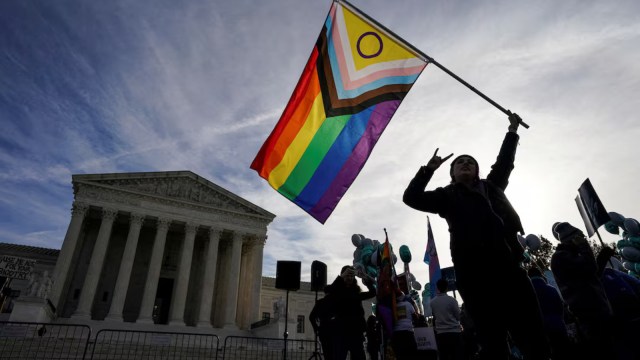US Supreme Court rejects call to overturn legalisation of same-sex marriages
The US Supreme Court, which has a 6-3 conservative majority, without comment, turned away the appeal in the 2015 Obergefell v. Hodges ruling, which is seen as a historic victory for LGBT rights in the United States.
 The US Supreme Court, which has a 6-3 conservative majority, without comment, turned away the appeal in the 2015 Obergefell v. Hodges ruling. (Photo: Reuters)
The US Supreme Court, which has a 6-3 conservative majority, without comment, turned away the appeal in the 2015 Obergefell v. Hodges ruling. (Photo: Reuters) The US Supreme Court on Monday rejected a call to overturn its landmark 2015 decision that legalised same-sex marriage nationwide. The appeal was moved by Kim Davis, the former Kentucky court clerk who refused to issue marriage licenses to same-sex couples even after court orders.
Who is the petitioner?
Davis has said that same-sex marriage conflicts with her religious beliefs as an Apostolic Christian.
Davis appealed after lower courts rejected her claim that the U.S. Constitution’s First Amendment right to free exercise of religion shields her from liability in the case. Davis was ordered to pay more than $360,000 in damages and legal fees for violating a same-sex couple’s right to marry.

Obergefell v. Hodges ruling
The US Supreme Court, which has a 6-3 conservative majority, without comment, turned away the appeal in the 2015 Obergefell v. Hodges ruling, which is seen as a historic victory for LGBT rights in the United States. It declared that the Constitution’s guarantees of due process and equal protection under the law meant states cannot ban same-sex marriages.
The ruling was 5-4, with now-retired conservative Justice Anthony Kennedy joined by four liberal justices. Kennedy wrote in the decision that the hope of gay people intending to marry was “not to be condemned to live in loneliness, excluded from one of civilization’s oldest institutions. They ask for equal dignity in the eyes of the law. The Constitution grants them that right.”
Overturning Obergefell would allow states once again to pass laws against same-sex marriage.
Her lawyers repeatedly invoked the words of Justice Clarence Thomas, who alone among the nine justices has called for erasing the same-sex marriage ruling.
Thomas was among four dissenting justices in 2015. Chief Justice John Roberts and Justice Samuel Alito are the other dissenters who are still on the court.

Roberts has been silent on the subject since he wrote a dissenting opinion in the case. Alito has continued to criticize the decision, but he said recently he was not advocating that it be overturned.
In her appeal to the top US judicial body, lawyers for Davis said that the same-sex marriage right – like the now-overturned right to abortion – is grounded in what they called the “legal fiction” of a principle called “substantive due process” that the Supreme Court has, in decisions over decades, said protects an array of personal freedoms.
In 2022, the court overturned the landmark 1973 Roe v. Wade ruling that had recognised a woman’s constitutional right to abortion and legalised the procedure nationwide. That ruling raised the hopes of many conservatives and Republicans who opposed Obergefell that the court would consider reversing the same-sex marriage right as well.







